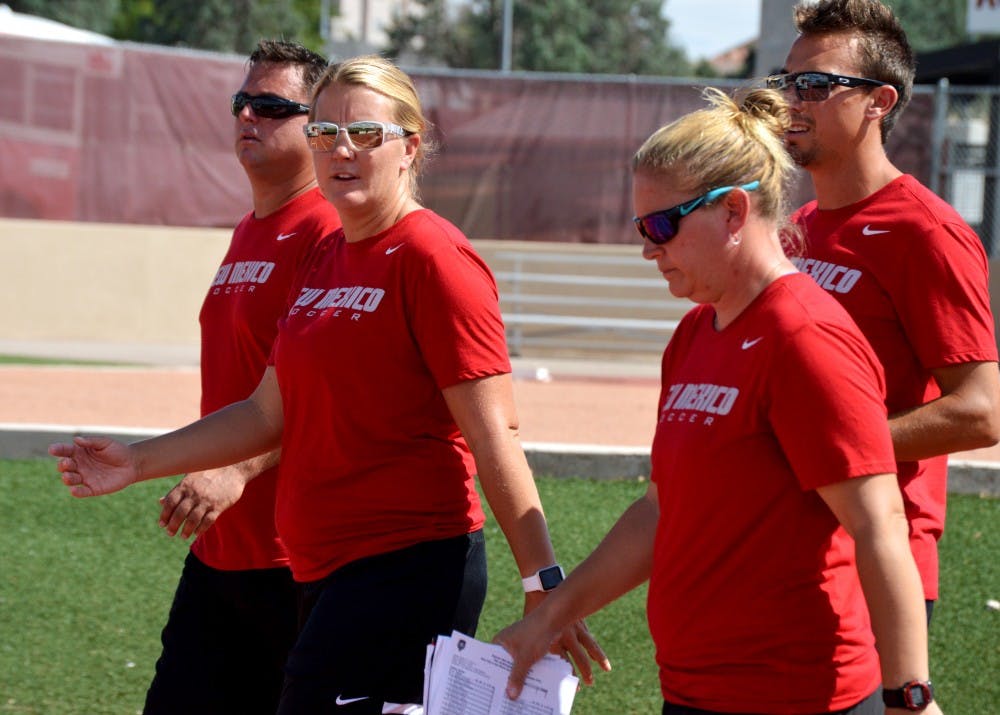Heather Dyche had never coached an NCAA Division I soccer team before the 2015 season, but that doesn’t diminish her qualifications. She’s been around the game for quite a while.
A coach licensed with organizations like the U.S. Soccer Federation, CONCACAF, the National Soccer Coaches Association of America and the U.S. Youth Soccer Association, the Albuquerque native also served as an assistant for the U14 U.S. national team. Her playing days included a stop at Florida State University.
With a resume like that, it’s apparent that Dyche knows what a soccer culture looks like, and she said she wants to develop one in the UNM women’s program.
“Honestly, I don’t really care what the culture was before,” Dyche said. “Some of it comes up because there’s things that are different for them and they need to learn how to reach to them, but for me it’s like, ‘this is where we’re taking Lobo soccer, and you’re on or you’re off.’”
Dyche defines a “sports culture” as the acceptable standards, behaviors and traits that players adhere to both on and off the field. That includes players recognizing who they are as athletes and the contribution each individual brings to the field.
The goal is to create responsible adults, Dyche said, and she feels soccer offers an opportunity to learn critical life lessons.
“You learn how to deal with losses,” she said. “You learn what to do when you’re in tough times. You learn how to communicate, and I think sometimes people don’t get that opportunity other than real-life experiences, but soccer can be such a valuable tool for those things.”
New Mexico’s program has something of a checkered recent history, with the 2009 hair-pulling incident by former Lobo Elizabeth Lambert against BYU, and last year’s hazing scandal that eventually led to then-head coach Kit Vela’s contract not being renewed. But both black marks are in the past, especially since one happened before this year’s seniors even joined the team.
UNM will take a new direction under Dyche’s guidance.
Dylann O’Connor, a senior midfielder, said the previous culture was a good one, and the players had always had strong camaraderie and support for each other. But under Dyche’s leadership, O’Connor said, seniority among teammates has gone. All players contribute to setting and cleaning up for practices. Younger players also play a larger role on the team, she said.
“In my opinion, a sports culture is just the relationship that players have with each other, and that portrays on and off the field,” she said. “I think that ... it just encompasses everything the team aims to reach.”
Dyche brought in assistant coaches Karley Nelson and Missy Strasburg, along with director of operations Brad Keller, who also contributes significantly to coaching. Dyche said she holds her staff in high regard.
Get content from The Daily Lobo delivered to your inbox
The head coach also puts her players in a position to set the tone of the culture. Dyche said she has an open-door policy with her players and wants to create a relationship of honesty between herself and her players.
“Part of our culture is we feel like our players need to help set what that is, so we give them a pretty strong voice in the things they think are important,” she said.
Another senior midfielder, Alyssa Coonrod, said the transition hasn’t been difficult.
“They’re very open, easy to talk to, very approachable,” she said. “They have high standards, but they care. They care so much, and also, with a team that has such positive attitudes and care about each other, it’s been so much of an easy transition.”
If anybody knows the challenges involved in establishing a new culture, it’s Lobo football coach Bob Davie. When he came to the program in 2012, the Lobos were considered among the worst programs in the country. Davie discussed establishing a disciplined program in that first year.
At a press conference earlier this season, Davie called it a night-and-day difference, and said he couldn’t be more proud of how far his program has come.
“You can come to practice and you can watch how we practice and do things, but at the end of the day it’s that,” he said. “I know how far we’ve come, but the bottom line is we have to win. The same is true with Heather.”
Defining the culture will always be a constant effort, Dyche said. It’s not just that she has to deal with being a first-year head coach. She said the same efforts will come into play whenever players come in from different high school coaches, different club teams and different states.
“That’s a new culture for them, too,” she said. “Our job as a staff is to clearly define what our culture is, what our expectations are, and it’s up to them, for the players, to adapt to that.”
J.R. Oppenheim is the managing editor for the Daily Lobo. Contact him at managingeditor@dailylobo.com or on Twitter @JROppenheim.






